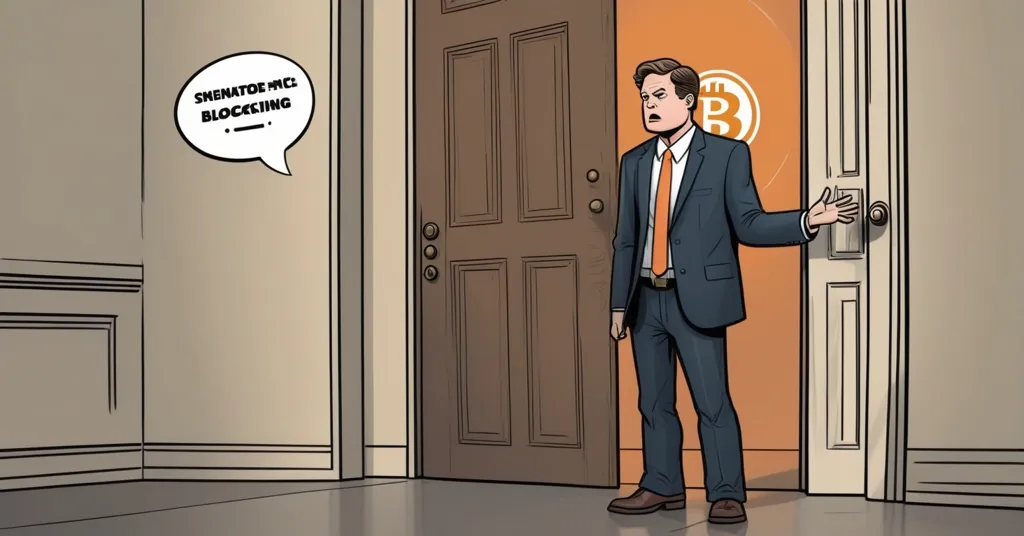Ripple CEO’s Meeting with Sen. Lummis Canceled Amid XRP FUD and Political Tensions

Ripple CEO Snubbed by Lummis: XRP FUD Fuels Crypto Drama
– Ripple CEO’s meeting with Sen. Lummis canceled.
– Speculation of influence by Lummis’ Bitcoin maximalist son-in-law.
– Ripple’s negotiations to acquire Circle amidst stablecoin legislation debate.
– SEC settlement denial adds to Ripple’s legal woes.
– Political tensions highlighted by Ripple’s donations.
What happens when a major crypto player’s meeting with a key legislator falls through? Drama, speculation, and a lot of FUD. The crypto world was rocked recently when Ripple CEO Brad Garlinghouse’s planned meeting with Senator Cynthia Lummis was abruptly canceled, igniting a firestorm of speculation and controversy. In a space where alliances and rivalries can shift the tides of regulation and market dynamics, this snub has left many wondering about the underlying tensions and their broader implications.
On May 19, 2025, Brad Garlinghouse was set to meet with Senator Cynthia Lummis, a key figure in U.S. cryptocurrency legislation and the chair of the Digital Assets Subcommittee. The cancellation came without rescheduling, leading Garlinghouse to publicly call out Lummis—a move that has stirred both support and criticism within the crypto community. “We were looking forward to a productive discussion on the future of digital assets,” Garlinghouse stated on Twitter. Speculation around the cancellation has pointed to the influence of Lummis’ son-in-law, Will Cole, a vocal Bitcoin maximalist and critic of Ripple. Cole’s stance against Ripple and its cryptocurrency XRP has fueled rumors that he may have played a role in the meeting’s abrupt end.
The timing of this cancellation is particularly notable. Ripple is currently in the midst of negotiations to acquire Circle, a company also eyed by Coinbase. This potential acquisition comes as the U.S. Senate debates the Genius Act, a bill aimed at regulating companies that create digital currencies designed to stay stable in value. The Genius Act’s amendment, proposed to prevent corruption related to stablecoin ventures by senior government officials, adds another layer of complexity to the legislative landscape. Ripple’s involvement in these discussions, coupled with its own legal battles, places it at the center of a contentious and evolving regulatory environment.
Ripple’s challenges are not limited to political and corporate maneuvering. The company faces ongoing scrutiny from the SEC, with a judge denying a settlement on May 15, 2025, that could have resolved Ripple’s legal issues. “The SEC’s refusal to settle prolongs our legal uncertainty,” explained Ripple’s legal team. This denial prolongs the uncertainty and potential impact on Ripple’s operations and market position. Additionally, Ripple has been criticized for its perceived centralization—a system controlled by a single entity rather than a community—and for allegedly dumping XRP to gain fiat revenue—a move that clashes with the decentralized ethos many in the crypto community hold dear.
The political arena has also become a battleground for Ripple. Co-founder Chris Larsen’s reported $10 million worth of XRP donation to Kamala Harris’s campaign has raised eyebrows, seen by some as an attempt to sway U.S. policy in Ripple’s favor. “Politics and crypto are more intertwined than ever,” noted a political analyst. This donation, alongside Ripple’s active support for pro-crypto candidates like Donald Trump, underscores the company’s strategy to influence legislative outcomes. However, such moves have also heightened political tensions, especially with the GOP’s opposition to central bank digital currencies (CBDCs), which Ripple has been known to support.
Amidst these developments, the crypto community remains divided. Bitcoin maximalists like Pierre Rochard have criticized Ripple for its stance on CBDCs and its perceived anti-Bitcoin position. Meanwhile, industry figures like Zach Rynes of Chainlink have questioned the wisdom of Garlinghouse’s public callout of Lummis, suggesting it could harm Ripple’s relationships within the industry. “Public spats rarely help in building bridges,” Rynes remarked.
The saga of Ripple’s meeting cancellation and the surrounding drama highlights the intricate dance between corporate strategy, regulatory battles, and political influence in the world of cryptocurrency. As Ripple navigates these choppy waters, the outcome will undoubtedly have ripple effects across the entire crypto ecosystem.
Key Takeaways and Questions
- What was the reason for the cancellation of the meeting between Brad Garlinghouse and Cynthia Lummis?
The exact reason remains unclear, but speculation suggests influence from Lummis’ son-in-law, Will Cole, a Bitcoin maximalist critical of Ripple.
- How does the timing of the meeting cancellation relate to other events in the crypto space?
The cancellation coincided with Ripple’s negotiations to acquire Circle and the Senate’s debate on the Genius Act, highlighting a complex interplay of corporate and legislative activities.
- What are the main criticisms against Ripple and XRP?
Ripple is criticized for its perceived centralization, allegations of dumping XRP for fiat revenue, and its involvement in traditional banking systems, which contrasts with the anti-banking ethos of many in the crypto community.
- What political tensions are highlighted in the article?
Political tensions include Ripple co-founder Chris Larsen’s donation to Kamala Harris, perceived as an attempt to influence U.S. policy, and the broader GOP opposition to central bank digital currencies (CBDCs).
- How does the SEC settlement denial impact Ripple?
The denial of the SEC settlement on May 15, 2025, prolongs Ripple’s legal challenges and could affect its operations and market position.



